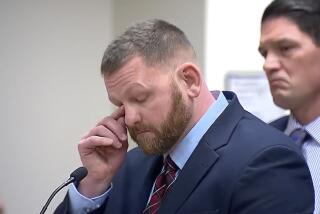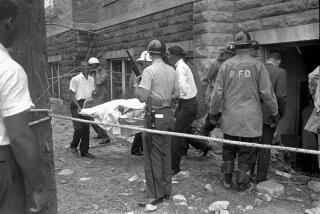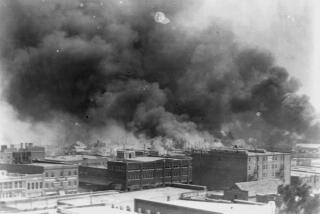Survivors Greet Verdict With Hugs, Tears
- Share via
OKLAHOMA CITY — A few hours before a jury found Timothy J. McVeigh guilty of planting the bomb that gutted the Alfred P. Murrah Federal Building and claimed 168 lives, Bud Welch stepped into the shade of an elm tree that survived the blast.
Under sunny skies, he leaned against the trunk, folded his arms and closed his eyes to shut out reminders of wreckage, sirens and death--and “remember the good times.”
With his back against the rough bark and a light breeze rustling the leaves overhead, the Oklahoma City service station owner visualized his 23-year-old daughter, Julie Welch, striding confidently across the street to meet him at a cozy Greek restaurant.
Welch and his daughter, a Spanish-language translator at the Social Security office, met there every Wednesday, he said, except April 19, 1995, when a 4,800-pound truck bomb blasted a nine-story crater at the site that has become the spiritual heartbeat of this city.
Like nearly everyone here, Welch was relieved that--after 23 hours of excruciating deliberations--the city’s prayers had been answered: Someone would pay for the hideous assault.
But no sooner was the verdict announced than his thoughts turned to the death penalty and then “a sadness crept in on me,” he said.
“To hell with the word ‘closure,’ ” he said. “How can there be closure? My little girl is not coming back, and that’s for the rest of my life.
“But I don’t want the death penalty--that’s the kind of vengeance that doesn’t leave you with peace,” he said. “God knows there’s been enough bloodshed.”
Welch was among hundreds of people who gathered at the chain-link fence surrounding the downtown bombing site that has become a makeshift memorial to the victims.
Covered with teddy bears, flowers, ribbons, photographs, poems and crosses made from twigs, it has stood as a boundary where everyone touched by the terrorist’s bomb could sort their emotions.
On Monday, however, they came to celebrate a crucial legal victory with hugs, handshakes and tears of joy and relief.
“The verdict has made it easier for me to breathe,” said Aren Almon-Kok, 25, mother of Baylee Almon, who was killed in the explosion the day after her first birthday and was the subject of a photograph that showed her cradled in the arms of a firefighter.
“This is a big victory for the state and the nation,” she added. “Now, on to the death penalty.”
Monday evening, Dr. Paul Heath, president of the 200-member Oklahoma City Murrah Building Survivors Assn., led a vigil at the “survivor tree,” where dozens of survivors and relatives of victims held hands and prayed.
“We celebrate the fact that we are alive,” Heath said, “and that the biggest mass murderer and assassinator this country has ever known was provided a fair and adequate trial.”
Among the group were people who had watched the trial on the closed-circuit television at the Federal Aviation Administration center on the outskirts of town--and then nervously awaited the verdict. Many held long-stem red and yellow roses as they sang “We Shall Overcome” and “God Bless America.”
Under the glare of video cameras aimed by a crush of news crews and visitors, they poured water from plastic bottles onto the ground around the tree. The gesture, they said, symbolized a benchmark: their ability to get rid of a portion of their grief.
“These may look like bottles of water, but they are much more than that,” Heath said. “Tonight, they symbolize how much of our freedom we have been able to give up since April 19, 1995 . . . how much of this trauma and grief . . . we’ve been able to resolve.”
Turning toward the tree, he said, “This tree may be gnarled and ugly, but its roots go deep into Oklahoma soil. Let’s give this tree a drink.”
Then, 774 days after its limbs were snapped and its leaves stripped by the concussion of the bomb, the survivors emptied their bottles of water on its roots.
Across town, sound technician Dan Grimes, 46, tried to explain the meaning of the fence and the verdict to his 3-year-old son, Patrick.
“Patrick, that is where a lot of babies got hurt,” Grimes said.
“Why, Daddy? Why did the babies hurt?” his son asked.
“Because someone was very angry,” Grimes said.
“Why?” his son implored.
“Patrick, I don’t know. I can’t answer that,” Grimes said. “But the person who did it is in big trouble.”
Although the swift trial helped this city’s wounds begin to heal, not even the hundreds of people who watched on the closed-circuit TV feed expected it to bring an end to the collective pain.
“People were praying for a guilty verdict--I was,” said Kari Ferguson, communications director for the Oklahoma City Memorial Foundation. “But it won’t bring back 168 lives.”
Jack Gage, 72, who rescued four people from the rubble, put it another way.
“I feel like 10,000 bricks just fell off my back,” he said, sitting in the wood-framed Heartland Chapel across the street from the Murrah building site. “But I don’t want to see him die. You could kill a man 10,000 times and it wouldn’t bring a thing back or put a thing back together.”
Regardless of the outcome of the upcoming penalty phase in the Denver trial, Oklahoma County District Atty. Bob Macy plans to file at least 160 state counts of first-degree murder against McVeigh as early as next spring.
“The crime was committed against Oklahoma citizens,” he has said. “The people need to be prosecuted in an Oklahoma court in front of an Oklahoma judge.”
Macy said he would not prosecute McVeigh until after the trial of co-defendant Terry L. Nichols. Nichols’ federal trial may be completed by September or October.
For all the smiles and cheers here on Monday, residents of this stretch of the Bible Belt expressed mixed feelings about whether McVeigh should be put to death.
Kathleen Treanor, 33, whose 4-year-old daughter, Ashley, and mother- and father-in-law perished in the Social Security office, said before the verdict that she had “prayed every waking moment” that McVeigh would be convicted and then die by lethal injection.
“There’s nothing on Earth that could punish that boy enough,” said Treanor, who traveled to Denver on Sunday to be ready to testify in McVeigh’s penalty hearing, which begins Wednesday. “I don’t look at Timothy McVeigh as being human--he’s an animal and that animal needs to die.”
“My child was a part of me and now I’m missing a piece of my heart,” she said.
Earlene Royal, 56, lost a cousin and a member of her church. Even so, she opposes the death penalty.
“There are many people here who carry hate in their hearts. I’m not one of them,” said Royal, a housekeeper at a downtown hotel. “And I don’t believe in the death penalty, not even for Timothy McVeigh.
“Oklahoma City will always be sad about what happened here. But we have to forgive and move on.”
Still, Welch wondered how it will be to carry on without what he called the sustaining force of “an adrenaline rush that has lasted two years.”
“I’ve actually used media interviews as therapy,” he said. “They’ve enabled me to tell the world about my kid and how great she was.”
Lately, he’s spending a lot of time on a tractor in some alfalfa meadows that have been in his family for decades.
“Julie used to say that when she got a raise at Social Security she’d buy me a tractor,” he said. “Well, she had a small insurance policy and I used that money to buy one.”
“Every time I get on that nice new tractor, I’m reminded of my daughter,” he said. “And of farm work. Working with the land. Planting things and making them grow. That’s what I call peace and serenity.
“Someday, I’ll have to forgive Timothy McVeigh,” he added, gazing at the fence. “If that’s possible.”
More to Read
Sign up for Essential California
The most important California stories and recommendations in your inbox every morning.
You may occasionally receive promotional content from the Los Angeles Times.











